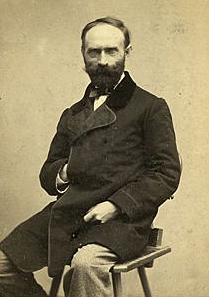Gustav Nottebohm facts for kids
Gustav Nottebohm (born November 12, 1817, died October 29, 1882) was a talented musician. He was a pianist, teacher, music editor, and composer. Gustav Nottebohm spent most of his life in Vienna, Austria. He is best known for his important studies about the famous composer Beethoven.
Contents
Early Life and Friendships
Gustav Nottebohm studied music in Leipzig, Germany. There, he met other famous composers like Felix Mendelssohn and Robert Schumann. In 1846, he moved to Vienna, Austria, which became his home.
In 1862, Nottebohm met Johannes Brahms, another very important composer. They became close friends for life. Brahms even helped care for Nottebohm when he was sick. He also made sure Nottebohm's funeral arrangements were handled.
Studying Beethoven's Music
Nottebohm was one of the first people to deeply study Beethoven's music. This field is now called 'Beethoven studies'. He looked for items related to Beethoven. He also created a special list of all Beethoven's works. This list is called a 'thematic catalogue'.
His most important work was about Beethoven's 'sketchbooks'. These were notebooks where Beethoven wrote down his first musical ideas. Nottebohm wrote many essays explaining these sketches. He helped us understand how Beethoven created his music. Some of Nottebohm's writings were published after he died. His student, Eusebius Mandyczewski, helped finish them.
A later expert on Beethoven, Joseph Kerman, praised Nottebohm's work. He said Nottebohm was very accurate and fair. He also said Nottebohm was good at finding the most important information.
Other Musical Interests
Nottebohm did not only study Beethoven. He also made a list of all the works by Franz Schubert. Schubert was another famous composer. Nottebohm loved collecting old music, too. He collected music from the Baroque period and even earlier. This included both songs and instrumental pieces.
After Nottebohm passed away, Brahms inherited some of his music collection. Brahms then gave this collection, along with his own library, to the Gesellschaft der Musikfreunde in Vienna. This is a famous music society.
Nottebohm's Own Compositions
Nottebohm also wrote his own music. Most of his pieces were for small groups of instruments. He also wrote a lot of music for the piano. One famous piece was a set of variations for two pianos. It was based on a dance tune called a Sarabande by J.S. Bach. Nottebohm often played this piece with his friend Brahms. Brahms even mentioned Nottebohm as a great composer of variations. He put him in the same group as Schumann.
 | James B. Knighten |
 | Azellia White |
 | Willa Brown |


